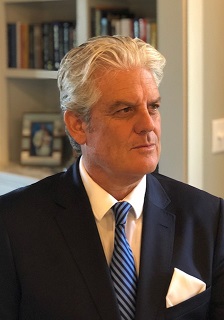From the CEO – October 2020

Dear Clients,
The breadth of the global pandemic has widened in recent weeks with countries such as France and Germany imposing fairly strict new national lockdowns. The spread is occurring in other parts of the continent, with the EU and its neighbors experiencing more new cases per capita than the US average and with equal death rates. Commentators naturally warn of a ‘dark winter’ ahead, and best-case estimates at the time of writing have a vaccine ready for emergency use by early December.
In these times one of the advantages to the ICRG risk series is that events such as the pandemic are eventually reflected in the data. In turn, this allows scholars in a number of disciplines to seize upon the insights generated.
In early June, noted Berkeley political economist, Barry Eichengreen (et al) questioned the political legacy of the C19 pandemic, particularly during an individual’s ‘impressionable years’ (ages 18-25). While the ICRG ‘Government Stability’ measure strongly predicted countries’ response time to C-19, the study also found negative effects on confidence in political leadership and institutions associated with healthcare-related policies at the time of the epidemic. (https://lnkd.in/dwap8UP)
Scholars associated with the IMF and its Working Paper series have also been active on the C19 front. By late summer, the Wall Street Journal reported on the impact of the virus on the global tourism industry and referenced some work by the Fund that found that economies with poor ICRG composite scores (which include a country’s current account and foreign debt exposure) saw their effective exchange rates plunge far more than less risky countries with better scores. While the connection seems obvious, the link between poor risk metrics and poor currency performance has been far closer during the C19 pandemic than during the global financial crisis of 2007-08. (https://www.wsj.com/articles/total-seizure-in-global-tourism-is-a-lingering-threat-for-emerging-markets-11597055867?st=kxkixkei97tias0)
Most recently Tahsin Saadi Sedkik and Riu Xu analyzed the connection between past pandemics, economic growth, inequality, and social unrest. Significantly, the authors found that past major pandemics, even though much smaller in scale than COVID-19, led to a significant increase in social unrest by reducing output and increasing inequality. Indeed, a vicious cycle was noted, too, as higher social unrest was associated with lower output and greater inequality, pointing to a vicious cycle.
A salient finding as regards the ICRG data: Pandemic events lead to significantly higher risk of civil disorder after 14 months. Five years after the pandemic, civil disorder is about 0.1 point higher than the pre-shock level. (https://www.imf.org/en/Publications/WP/Issues/2020/10/16/A-Vicious-Cycle-How-Pandemics-Lead-to-Economic-Despair-and-Social-Unrest-49806)
Turning to the ratings for the month, a number of highlights are worth mentioning. In the Americas, divisions have emerged in Argentina’s ruling coalition as cases of C19 continue to rise. There is talk now of a cabinet shuffle and a weaker peso in the offing. Following the impact of C19, protests in Costa Rica have turned violent over proposed tax hikes and possible mobility restrictions. President Alvarado’s approval rating has fallen as the jobless rate crested the 20% mark.
In Europe, France is now the new C19 epicenter and a second lockdown has been implemented. Macron’s popularity has ebbed once again given questions about the efficacy and direction of overall policy. Hungary’s Orban has also suffered a setback in his standing over his approach to the second wave of the pandemic. Consumer confidence levels have trended down for the past several months.
In Eastern Europe, clashes between the forces of Armenia and Azerbaijan continue despite a number of ceasefire agreements. The violence is the worst since 1994. And protests continue sporadically in Bulgaria, as almost half the electorate wants the prime minister to call it a day.
Over in Africa, the post-coup regime in Mali is filled quite unsurprisingly with military officials, as the US and EU suspend aid to the country. Mali continues to fight jihadists in the northern sections of its territory. Threats of sanctions by ECOWAS (the idea was for the coup plotters to have a civilian regime installed quickly) failed to materialize. In Senegal, concerns surface over rising C19 induced poverty levels, while significant oil and gas reserves hold out hope for a robust global recovery in 2021.
In Asia, Prime Minister Arden won an unexpected landslide victory in New Zealand’s October election. The country has done an effective job in curtailing the spread of C19, which is reflected in the absence of mobility restrictions and higher consumer confidence levels at the moment. Protests continue in Thailand, drawing thousands to the street. The dissenters want the current prime minister out, a new and more democratic constitution, and reforms to the country’s monarchy so that it is more accountable and transparent.
Finally, in the Middle East, Saudi Arabia’s ties with Israel look to be on the path towards ‘normalization’ as the authorities in Riyadh look to continue to auction off state assets to fund the budget shortfall. Algeria’s attempt at constitutional reform is to be put to the test in a national plebiscite in early November, despite its critics who say it is little more than ‘window-dressing’ and more about neutralizing the Hirak movement, which forced the last president from office in 2019.
In other news, October was another stellar month for new and returning clients. On the former, we welcome a range of organizations, including: The Latin American Reserve Fund, University of Texas at Arlington, North-West University, Victoria University, Michigan State University, McGill University, and Bahçeşehir University. On the latter, we would like to welcome back Dartmouth College, Griffith University, Leggett & Platt Inc., UNICEF, University of California Berkeley, Wellington Asset Management, and Morgan Stanley Investment Management. Thank you very much for your continued support, as always.
In 2021, PRS will be unveiling several new product and data packages for our clients, designed to accommodate the ever-increasing demand for back-tested and high-frequency data. Given the relevance of the ICRG data to the new risk environment created by the pandemic – along with the significant insights being generated consistently – the new offerings will make it easier for academics in particular to realize their research and publication goals.
Quid Periculum: Managing Political Risk in an Age of Uncertainty, co-authored and co-edited by Peter Marber (Harvard/ Aperture Investors) and me, is in post-production. The book, which features chapters by some of the leading authorities in academe and the financial community, is now available for pre-order. Contact Louis Carroll, PRS’ Director of Business Development, for more information. (lcarroll@prsgroup.com)
PRS’ partnership with Toggle – an AI-based trading and portfolio management platform, backed by some of the largest investment names in the world – continues to flourish. Our data will soon be available for subscription, generating investible actions in this very interesting time for investors. The data will also be available on all major trading platforms. We are very happy with our relationship with Toggle, as their professionalism and unique insights further underscore the future of geopolitical risk.
Our early-stage discussions with the data analytics departments from several of our academic clients in the US continues, with the aim of providing the most comprehensive, AI-generated data on geopolitical risk available anywhere. Stay tuned for more details in the months to come.
PRS’ Private Client Advantage, which offers clients a greater diversity of data offerings and regular updates, consultations, bundled products, and more, is – judging from client demand – even more essential. Contact us for details. With the fluidity of the ratings, this benefit for clients is especially important.
Our ICRG data series continues to be the gold standard among the world’s leading academic researchers and multilateral organizations. Our corruption scores have been noted as ‘more reliable’ than Transparency International or World Governance Indicators, according to a study in the American Journal of Economics. A recent IMF Working Paper study, using ICRG metrics as a proxy for ‘institutional control’ (inter alia), found that public outlays on education, health, et al., have a significant impact on socioeconomic outcomes, where a 10% increase in spending per capita could close 20-65% of the UN’s HDI gap between countries of the region and their global peers. And a series of studies originally published in the Journal of Political Economy found that – via our ‘Government Stability’ risk metrics – ‘political booms’, defined as an increase in government popularity, precede financial crises. Improvements in public opinion towards the current regime increases significantly in the run-up to a country’s financial crash.
Thanks for your continued support, and please contact us if we can be of any assistance.

Chief Executive

PRS INSIGHTS
Moving beyond current opinions, a seasoned look into the most pressing issues affecting geopolitical risk today.
EXPLORE INSIGHTS SUBSCRIBE TO INSIGHTS
